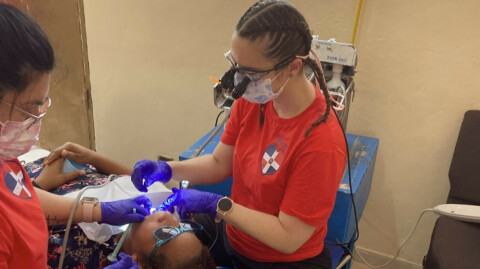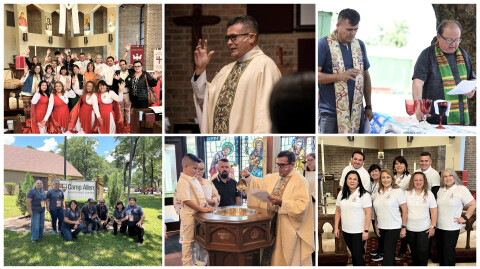TLDR: We understand the rhythms of Holy Week because they are the rhythms of life itself. We have an empathic God who knows our afflictions because he suffered great afflictions himself.
We understand the rhythms of Holy Week because they are the rhythms of life itself. Right before this week, we encountered the great theme of love. Mary of Bethany lovingly anointed the feet of Jesus (in reparation for burial.) This remarkably intimate and symbolic gesture set the mood for what we are about to experience. This week, on Palm Sunday, we experienced the County-Fair atmosphere that took place when Jesus entered Jerusalem. Jesus, riding on a donkey, came down from the Mount of Olives into the crowded streets of the city. Kids were running about, disciples shouted, “Hosanna!” (a common chant when a king returned home from some military conquest or victory,) and people waved palm branches in shouts of great exaltation. The preacher many had seen in action, and many others had heard about, had finally marched into the city. We must not think of their shouts of acclamation as “symbolic,” or “metaphorical,” or somehow spiritual affirmations that “God was in their midst.” People were really excited about the possibility that Jesus might be a military figure, ready to start a glorious revolution. They were filled with hope that this Jesus might be the historical Messiah announced by the prophets. These were not the people of Paris welcoming the “King of Fools” in Victor Hugo’s The Hunchback of Notre Dame. On this day, we saw the great theme of joy and exaltation at the arrival of a conquering king. The people saw themselves on the verge of revolution.
On Maundy Thursday, we see deep sadness. Jesus acknowledged publicly that he had been betrayed by one of his friends. He used the opportunity to teach them with an earnestness and passion not seen before. He took bread and wine and vested them with extraordinary significance by building a bridge between that supper and his passion. “This is my body!” then “This is my blood!” Every time we break bread and share wine together, his presence among us becomes real and tangible for those who have faith. On that famous meal, he spent a great deal of time talking about the unity he desired for his Church. He invited his friends to servant leadership and prayed that God might give them the humility necessary to act on his behalf. He washed his disciples feet to highlight the type of servant leadership he was talking about, and he served them because he came to earth to serve and not to be served. Then he commanded them to love each other as he had loved them. This was a sacrificial love willing to die on a cross.
From this sad, nostalgic, and deeply moving scene, we come face to face with the forces of evil. The theme of injustice becomes prevalent. The rhetoric of those who condemned Jesus seek to carry the day, “It is better for one to die than for the whole nation to die.” The accusers rationalized and lied to themselves that it was for love of God and nation that they were doing what they were doing. To add to their rationalizations, the best friend became so rightly terrified at the spectacle unfolding before him, that he too denied knowing Jesus. The denier and Jesus exchanged a brief moment of eye contact. Can you imagine Jesus’ complete loneliness at that moment? Even his best friend has abandoned him!
The theater of the macabre on Good Friday introduced us to very painful actions: The kiss of a traitor, the denial of a friend, the disrespect of a Roman bureaucrat, the shouts of the masses, the insults of those who mock him and spit on him, the licks of the lash cutting his skin, the agony of a crown of thorns dug forcefully into his skull, the weight of the cross on his shoulders, the indescribable pain of heavy nails cutting through nerves and cartilage on his hands and legs, the insults of the bystanders, the thirst, the complete sense of abandonment, the heat, the sweat…, the labored breath, and finally, the death of the Son of God. Nothing that happened on that Friday was “Good!” The only “Good” was the young man dying on that cross. He was the “Good Man” of that tragic Friday, and his willing presence on that cross made that day uniquely good. On Good Friday, love died on a cross of hate. Arms of wood housed arms of love; under whose embrace the entire world fits safely. For those who believe the events of that day accomplished God’s plan for the salvation of humanity, Scripture was fulfilled on that Friday we call “Good,” and the prophets voices found their awaited climax.
From these tragic events, we move into the saddest day in history. A day of complete abandonment and desolation. Jesus lied in a cold tomb. His lifeless body rested on a slab on the floor of a dark cave. His final cries on the cross, “My God, my God, why have you forsaken me (abandoned me, turned your back on me, refused to help me…)” are felt in the hearts of Jesus’ family, friends, disciples, and all those who had been the recipients of his grace and love for three years of public ministry. That feeling of complete failure and the deep regrets of what-could-have-been make his friends wonder if they wasted three years of their lives. They left everything behind because they wanted to see the military victory of Israel over her enemies, and they had believed Jesus would be the one to accomplish victory over Rome. But they have nothing to show for their sacrifice. Jesus had died as a common criminal. How could they have been so wrong? Where could they go now? How would life ever be anything more than an ever-present sense of regret and disappointment?
At the moment of darkest loss and desperation, an early-morning visit to the tomb brings news of resurrection to the disbelieving disciples. Jesus has risen, they claimed. This darkest day in history suddenly became the eight-day! The day of resurrection. The new day, filled with life and joy. We will speak more about resurrection soon, but for now, I want us to stay with the emotions of Holy Week. Let us not rush to Easter too soon. Let us allow ourselves to feel the anger, loss, and tragedy of this week.
We understand the rhythms of Holy Week because they are the rhythms of life itself. Many of us have felt betrayed and misunderstood. Some of us have felt disowned by friends who distanced themselves from us out of fear, or whose sudden disapproval of our faith leads them to walk a separate path. Some of us have been victimized or sinned against. Some may have even experienced physical violence at the hands of people they loved and respected. Some have seen a slow decline in health as they are assaulted by ailments that impose a heavy burden on them. These burdens are your own cross and no one but you can carry them. Many have felt ridiculed, mocked, patronized, and discounted. Many have felt falsely accused and villainized unfairly. Many have felt completely alone in the universe, forgotten and abandoned by those who loved them once. Some are suffering unique afflictions not mentioned yet in this blog. The point today is that Jesus can empathize with our afflictions because he himself suffered every assault imaginable. Our God has humanity under his skin. He knows what it feels like to be human. He knows the sting of betrayal and the pain of hatred.
Whatever your affliction today, please know that Jesus loves you in unimaginable ways. Your vindication awaits. Do not despair. God is on the move. Your salvation is near.
May God continue to bless you,
Fr. Roman+





